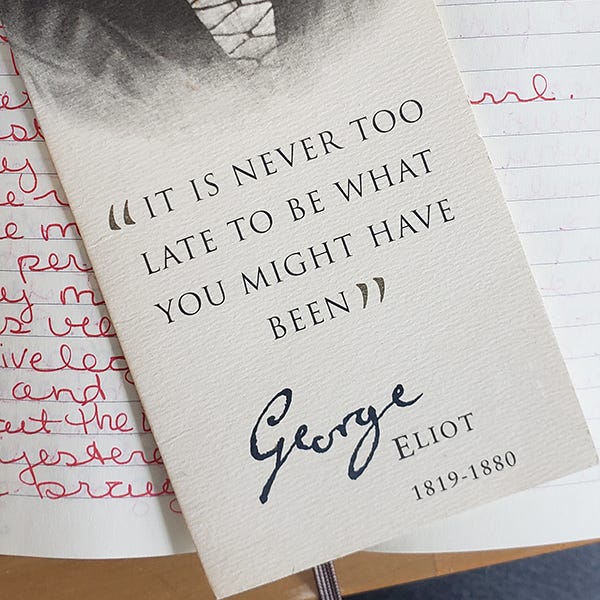It's never too late ... or is it?
What if you don't know what you "might have been?" Then what?
I love a good inspirational quote. I surround myself with affirmations pinned to my walls, written in journals, framed on my desk; I even have one tattooed on my body. When the topic is midlife reinvention, I have often cited this one, attributed to the 19th-century writer George Eliot, “It is never too late to be what you might have been.” But lately, I have begun to question this assertion—in particular, its backward-looking bend.
It reminds me of the colloquialism “shoulda-woulda-coulda,” which we use casually to express dissatisfaction with our choices. Sometimes the choice is of little consequence, as in “I ‘shoulda’ had the fruit cup instead of the pie.” But frequently, especially if we are deep in the mode of self-reflection, the words reveal deeper regret. “If only I would have had more confidence in myself, fought harder, made a better choice …, then I could have …” (fill in the blank).
Recently I came across a beautifully illustrated derivative of the quote on one of my social media feeds. It said, “Become the woman you always should have been.” There’s that word again, should. At least the Eliot version uses the word “might,” which seems to suggest future possibilities. But “should?” That says obligation, responsibility, duty. In other words, “you fucked up, try again.”
The thing that bugs me most about this appeal to what I might or should have been is that it supposes I know who this is, this woman that I am supposed to become—that I have always known, but just couldn’t or wouldn’t reveal her. After all, the examples seem to be everywhere lately. Reinvention is trending and romanticized. There is the Wall Street financier turned cheesemaker, the global sales executive gone home to save the family farm, the tech entrepreneur turned yogi. We see people realizing their fantasy professions in Sunday paper feature stories and on our social media feeds like it’s so easy—like it was what always should have been.
What we don’t see though is the planning and thought that goes into making a big change in the middle of one’s life. We don’t often read about the fear, uncertainty, and doubt—“What will I do? Who do I want to be?” We don’t learn from the reinventions that fail—when reality doesn’t jive with the fantasy. Instead, a growing reinvention industry of life-coaching, workshops, and self-help books entreat us to find and fulfill our destiny!
“It is never too late to be what you might have been,” intones George Eliot from bookmarks, magnets, and memes. Here’s the thing about her words of encouragement, though. There doesn’t appear to be any evidence that she ever said or wrote them. And why would she?
The author was no stranger to reinvention, but it’s doubtful she was inclined to regret. Born Mary Ann Evans, by all accounts an unattractive woman from the English countryside, she used a pen name to differentiate her work from the typical light romances published by women of her day. Not only did she write what is considered one of the greatest novels in the English language, Middlemarch, she also channeled her sexuality, intelligence, and charm into leading a passionate and full life of her own making.
No doubt, we all have a long list of “shoulda-woulda-couldas.” As I look forward to a beach vacation in under a month, I think I should have stuck with my diet over the holidays because I would have fit into my bathing suit, if only I could have resisted the temptation. If I look back on my major life choices, there are many candidates for the list, but I choose not to add them to it.
Sure, I’d like to undo the cheese plates and Christmas cookies, but to wish for impossible do-overs on the milestones of my life, discarding all that I’ve learned and experienced, is nonsensical. Looking back at whatever might “have been” is to examine forces over which I now have no control. It is, in fact, too late to be what I might have been, and I’m okay with that.



